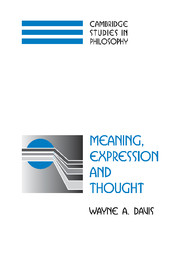Book contents
- Frontmatter
- Contents
- Preface
- 1 Introduction
- Part One Semantic Acts and Intentions
- Part Two Languages and Semantic Acts
- Part Three Thoughts and Ideas
- 12 Thought
- 13 Sentences, Propositions, and Thoughts
- 14 The Constituency Thesis
- 15 Ideas or Concepts
- 16 The Possession of Concepts
- 17 The Acquisition of Concepts
- 18 The Association of Ideas
- 19 Objects, Images, and Conceptions
- 20 The Language of Thought Hypothesis
- Part Four Ideational Theories of Meaning
- References
- Index
14 - The Constituency Thesis
Published online by Cambridge University Press: 20 July 2009
- Frontmatter
- Contents
- Preface
- 1 Introduction
- Part One Semantic Acts and Intentions
- Part Two Languages and Semantic Acts
- Part Three Thoughts and Ideas
- 12 Thought
- 13 Sentences, Propositions, and Thoughts
- 14 The Constituency Thesis
- 15 Ideas or Concepts
- 16 The Possession of Concepts
- 17 The Acquisition of Concepts
- 18 The Association of Ideas
- 19 Objects, Images, and Conceptions
- 20 The Language of Thought Hypothesis
- Part Four Ideational Theories of Meaning
- References
- Index
Summary
We have asserted on several occasions that thoughts are complex mental events. They have components that occur together in certain relationships when the thoughts occur. The thought that today is Monday and tomorrow is Tuesday has as a component the idea that today is Monday. The thought that the sky is blue has as components the idea of the sky and the idea of being blue. Hence thoughts are composed of ideas, and thinking is ideation. The assumption that thoughts are complex played a central role in developing the expression theory of meaning. The recursion clause of the neo-Gricean analysis depends on it, as does the theory's ability to account for subsentential word meaning. In the next chapter, we will use the fact that ideas (or equivalently, concepts) are thoughts or parts of thoughts in order to define “idea.” While widely affirmed, the thesis that thoughts literally have parts has been questioned by many and vehemently denied by some. Since the postulate is foundational to everything else in this book, and central to cognitive psychology, this chapter will be an extended argument for the constituency thesis. We will observe in passing that while the thesis is plausible for thoughts and the objects of belief, it fails for the act of belief and other propositional attitudes.
IDEAS AS THOUGHT-PARTS
The relationship between words and ideas is like that between sentences and thoughts (§13.1). Words express ideas, just as sentences express thoughts.
- Type
- Chapter
- Information
- Meaning, Expression and Thought , pp. 368 - 406Publisher: Cambridge University PressPrint publication year: 2002



